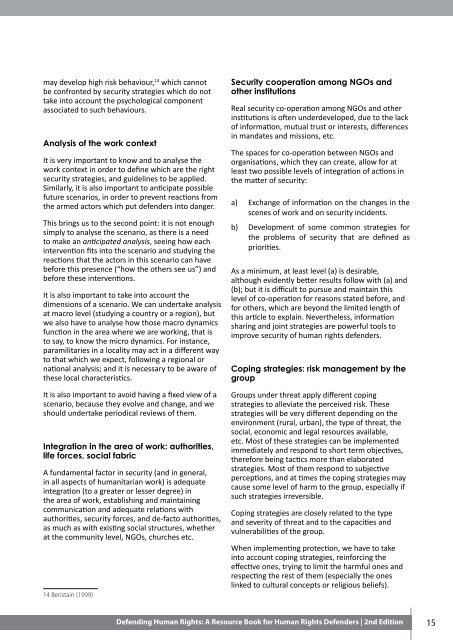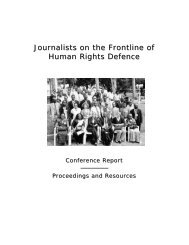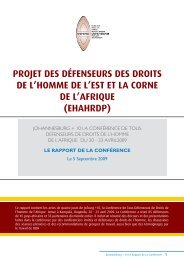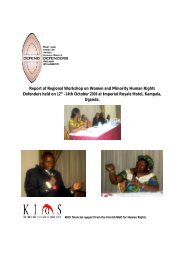Defending Human Rights: A Resource Book for Human
Defending Human Rights: A Resource Book for Human
Defending Human Rights: A Resource Book for Human
You also want an ePaper? Increase the reach of your titles
YUMPU automatically turns print PDFs into web optimized ePapers that Google loves.
may develop high risk behaviour, 14 which cannot<br />
be confronted by security strategies which do not<br />
take into account the psychological component<br />
associated to such behaviours.<br />
Analysis of the work context<br />
It is very important to know and to analyse the<br />
work context in order to define which are the right<br />
security strategies, and guidelines to be applied.<br />
Similarly, it is also important to anticipate possible<br />
future scenarios, in order to prevent reactions from<br />
the armed actors which put defenders into danger.<br />
This brings us to the second point: it is not enough<br />
simply to analyse the scenario, as there is a need<br />
to make an anticipated analysis, seeing how each<br />
intervention fits into the scenario and studying the<br />
reactions that the actors in this scenario can have<br />
be<strong>for</strong>e this presence (“how the others see us”) and<br />
be<strong>for</strong>e these interventions.<br />
It is also important to take into account the<br />
dimensions of a scenario. We can undertake analysis<br />
at macro level (studying a country or a region), but<br />
we also have to analyse how those macro dynamics<br />
function in the area where we are working, that is<br />
to say, to know the micro dynamics. For instance,<br />
paramilitaries in a locality may act in a different way<br />
to that which we expect, following a regional or<br />
national analysis; and it is necessary to be aware of<br />
these local characteristics.<br />
It is also important to avoid having a fixed view of a<br />
scenario, because they evolve and change, and we<br />
should undertake periodical reviews of them.<br />
Integration in the area of work: authorities,<br />
life <strong>for</strong>ces, social fabric<br />
A fundamental factor in security (and in general,<br />
in all aspects of humanitarian work) is adequate<br />
integration (to a greater or lesser degree) in<br />
the area of work, establishing and maintaining<br />
communication and adequate relations with<br />
authorities, security <strong>for</strong>ces, and de-facto authorities,<br />
as much as with existing social structures, whether<br />
at the community level, NGOs, churches etc.<br />
14 Beristain (1999)<br />
Security cooperation among NGOs and<br />
other institutions<br />
Real security co-operation among NGOs and other<br />
institutions is often underdeveloped, due to the lack<br />
of in<strong>for</strong>mation, mutual trust or interests, differences<br />
in mandates and missions, etc.<br />
The spaces <strong>for</strong> co-operation between NGOs and<br />
organisations, which they can create, allow <strong>for</strong> at<br />
least two possible levels of integration of actions in<br />
the matter of security:<br />
a) Exchange of in<strong>for</strong>mation on the changes in the<br />
scenes of work and on security incidents.<br />
b) Development of some common strategies <strong>for</strong><br />
the problems of security that are defined as<br />
priorities.<br />
As a minimum, at least level (a) is desirable,<br />
although evidently better results follow with (a) and<br />
(b); but it is difficult to pursue and maintain this<br />
level of co-operation <strong>for</strong> reasons stated be<strong>for</strong>e, and<br />
<strong>for</strong> others, which are beyond the limited length of<br />
this article to explain. Nevertheless, in<strong>for</strong>mation<br />
sharing and joint strategies are powerful tools to<br />
improve security of human rights defenders.<br />
Coping strategies: risk management by the<br />
group<br />
Groups under threat apply different coping<br />
strategies to alleviate the perceived risk. These<br />
strategies will be very different depending on the<br />
environment (rural, urban), the type of threat, the<br />
social, economic and legal resources available,<br />
etc. Most of these strategies can be implemented<br />
immediately and respond to short term objectives,<br />
there<strong>for</strong>e being tactics more than elaborated<br />
strategies. Most of them respond to subjective<br />
perceptions, and at times the coping strategies may<br />
cause some level of harm to the group, especially if<br />
such strategies irreversible.<br />
Coping strategies are closely related to the type<br />
and severity of threat and to the capacities and<br />
vulnerabilities of the group.<br />
When implementing protection, we have to take<br />
into account coping strategies, rein<strong>for</strong>cing the<br />
effective ones, trying to limit the harmful ones and<br />
respecting the rest of them (especially the ones<br />
linked to cultural concepts or religious beliefs).<br />
<strong>Defending</strong> <strong>Human</strong> <strong>Rights</strong>: A <strong>Resource</strong> <strong>Book</strong> <strong>for</strong> <strong>Human</strong> <strong>Rights</strong> Defenders | 2nd Edition 15








